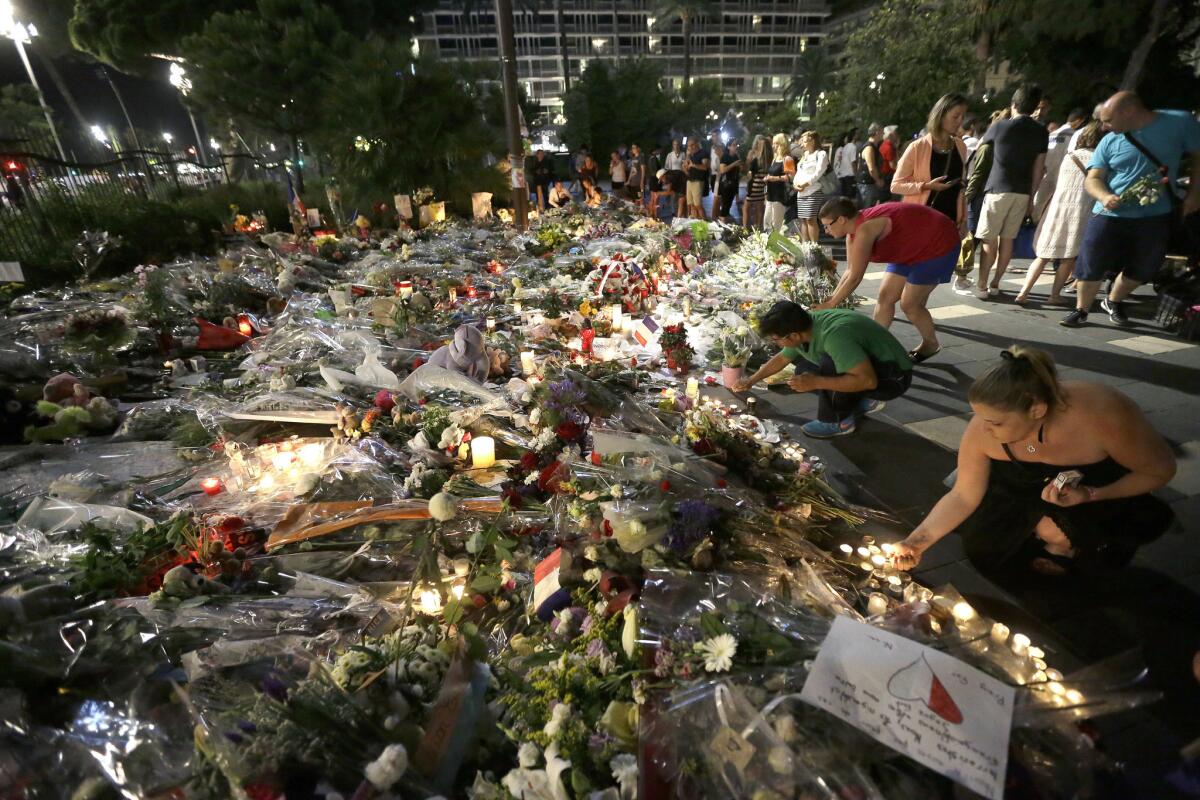Residents of the gritty Nice neighborhood where the attacker once had lived wonder what happens next

- Share via
Reporting from Nice, France — Karim Madani has spent his life in a rough section of Nice, where many immigrants from North Africa grow up with diminished dreams and limited opportunities a world away from the glamorous Mediterranean shoreline.
But Madani, who was walking his 8-year-old daughter home Monday in the low-rent, high-rise section of Nice, started to get excited when asked about his nationality in a country increasingly riven by divisions after a terror attack that killed 84 people on Bastille Day last week.
“I’m French, I’m entirely French, I was born in Nice 38 years ago and have lived here my whole life but people still look at me and see an Arab,” said Madani, whose parents immigrated from Algeria four decades ago. “I can barely speak Algerian and the last time I was there on vacation four years ago everyone called me French. But here everyone sees me as Arab and some even think ‘Arab terrorist’.”
Madani said it was never easy being Arab in France because of a lingering prejudice, but that the attack by a Tunisian immigrant last week was bound to make things more difficult for people like him, whose roots are in France’s former North African colonies.
To make things worse, the attacker who drove a truck through the holiday crowd, 31-year-old Mohamed Lahouaiej Bouhlel, some time ago had lived around the corner in the same downtrodden banlieue, or outlying low-rent neighborhood.
Bouhlel, who was shot and killed by police during the attack, was one of about 600,000 Tunisians in France.
The immigrant-dominated quarter of North Nice is only about four miles inland from the Mediterranean and the Promenade des Anglais where Bouhlel caused so much death and destruction. But it feels like a parallel universe far removed from the sea, the pebble-stone beaches, the posh shops, fancy restaurants and glamour that has made France’s fifth largest city one of the world’s most famous tourist destinations.
High-rise tenement buildings are strewn out along the hillside and represent a stark contrast to the Old Town charms of the 19th century buildings that line the streets in the center of town. Hardly a tourist strays into North Nice and the streetcar connecting the quarter to the city center generally empties out long before the last stop at what is in every sense of the word -- the end of the line: North Nice.
Pictures of the yellow high-rise nearby where Bouhlel had previously lived with his wife and children have been shown over and over again on French television. Reminding the country of the origins of the perpetrators in two other major terror attacks, those TV images have reinforced a notion among some French that immigrants from North African countries are not really part of France.
“This part of town has always been a bit cut off and different, I don’t really understand why it’s like that,” said Yassine Asouali, a 33-year-old from Morocco who moved to France 13 years ago to study information technology. He said he lives in a suburb east of Nice.
Whereas luxury cars with license plates from Italy, Monaco, Switzerland, Germany and France are seen cruising up and down the Promenade des Anglais along the coast, there are mostly small battered and broken cars in the parking spaces in North Nice.
Kamel Meziane, a 46-year-old who came to France from Algeria 13 years ago, said he was sickened by Thursday’s deadly terror attack and that he was confident that most French people would differentiate between a relatively small number of radicals and the larger population of law-abiding immigrants.
The nation paused for a moment of silence Monday to mourn the victims of the attack. In some cases people booed or jeered political leaders, a display of frustration at a moment of national grieving.
“We absolutely deplore what’s happened,” said Meziane, who works in a small computer repair shop in the former abattoir, or slaughterhouse, section closer to the center of Nice near the rail station. “It’s absolutely horrible and no one has any understanding for such a radical.”
He said the ethnically mixed neighborhood that is only about one mile inland from the Mediterranean shoreline has been a bastion of tolerance as long as he has lived there – even though anti-Muslim sentiment in the province surrounding Nice has been rising in recent years, especially after a series of major terror attacks began 18 months ago.
Likewise, Sara Mira, who grew up in North Nice, was confident that France would not be divided. Mira, who was working in an Old Town convenience store and plans to start studying law in September, said she had been crying all weekend because her 13-year-old sister’s best friend was killed in last week’s attack.
“There are some small-minded people who will think that because the attack came from a Tunisian that every Muslim is a potential threat like that,” said Mira, 18, whose mother is from Tunisia and her father from France. “Most people in France have an open-enough mind to differentiate.”
Kirschbaum is a special correspondent.
More to Read
Sign up for Essential California
The most important California stories and recommendations in your inbox every morning.
You may occasionally receive promotional content from the Los Angeles Times.













